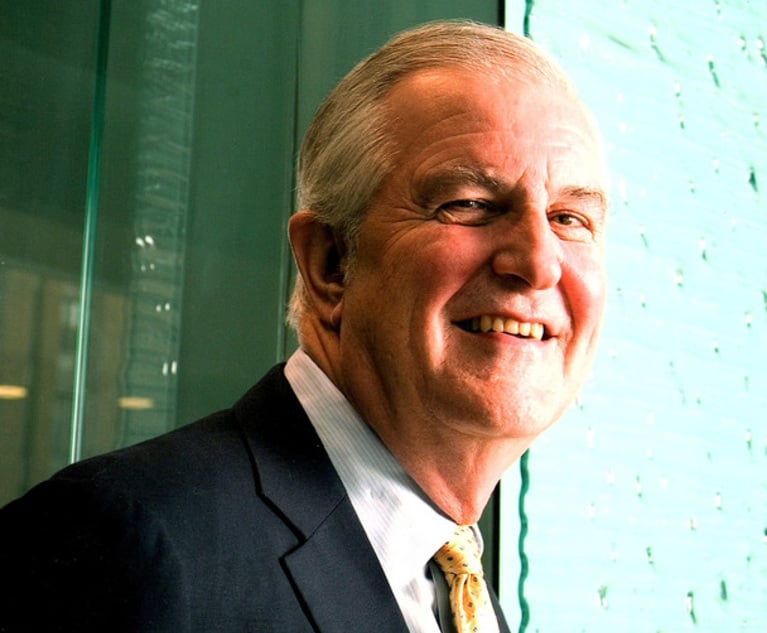In the Quest to Innovate, Where Will Law Firms Look Next?
Outsourcing and legal analytics are likely to take up firms' attention in 2019.
December 26, 2018 at 03:31 PM
3 minute read

Outsourcing. Some may see it as a dirty word, but corporate outsourcing crossed the transom into legal departments in 2018. Most notably, UnitedLex inked deals with DXC Technology Co., General Electric and Ford Motor Co. to take over processes including negotiating contracts and handling all aspects of a company's intellectual property portfolio. UnitedLex, which in October sold a majority stake to private equity firm CVC Capital Partners, says it inked deals worth an eventual $1.5 billion in an 18-month period.
Some general counsel have been attracted by the savings that come with a professional outsourcing deal. DXC says it cut legal costs by 30 percent. It also rebadged 150 lawyers and professionals from DXC's payroll to UnitedLex's. Those twin tailwinds—lowering costs and increasingly large in-house staffs—suggest outsourcing will continue to spread through legal departments in 2019.
Looking forward to the new year, expect the industry to keep innovating with analytics. Big data may feel like an overused buzzword. Yes, it has been around for a while. But law firms are finally using data analytics in two crucial ways. The first is to better manage their businesses. The second, with the help of a growing roster of tech products, is to be better lawyers.
On the lawyering front, legal analytics took a major step forward at the end of 2018 when LexisNexis launched a new tool that analyzes the language of judges' opinions to tell litigators what cases they cite most often, why, and for what types of motions. Nik Reed, who founded Ravel Law, the company whose technology LexisNexis Context is based upon, says the tool is equivalent to having a conversation with a judge's clerk. The tool represents only the start of a new level of analysis. Reed says the company will look to analyze individual lawyers' briefs, which, when matched with its analysis of judges' opinions, could allow clients to know how frequently certain lawyers craft arguments that judges use in their opinions. Down the line, says Rick Merrill, CEO of litigation analytics company Gavelytics, metrics like that will be the predominant way that lawyers are hired.
“It will be unthinkable to not refer to those metrics when making litigation strategy and tactical decisions,” Merrill says. “People will look back and laugh. 'Can you believe we used to not do this?'”
Analytics will be used to do more than unearth new measurements of the most persuasive lawyers. Law firms are quickly learning how to harness data from their disparate records-keeping systems to create a more rigorous pricing process. Consider a Fenwick & West tool that matches the firm's financial and docketing databases to create a real-time tracker for the cost of its patent prosecution work. The application helps partners who manage the process know when deadlines are coming up, while also showing the firm if a matter is running above cost. The firm plans to apply a similar system for its broader litigation group, says Kevin Vaarsi, Fenwick's director of pricing and product development. The firm has also created an experience database that has captured 20 aspects of 1,000 M&A deals as a way to both help lawyers find relevant documents and for its pricing team to find better ways to price its deals.
“We are transforming the way we operate,” Vaarsi says. “We've come a really long way in terms of making data-backed decisions for financial decisions. But there are always ways we can improve on that.”
This content has been archived. It is available through our partners, LexisNexis® and Bloomberg Law.
To view this content, please continue to their sites.
Not a Lexis Subscriber?
Subscribe Now
Not a Bloomberg Law Subscriber?
Subscribe Now
NOT FOR REPRINT
© 2025 ALM Global, LLC, All Rights Reserved. Request academic re-use from www.copyright.com. All other uses, submit a request to [email protected]. For more information visit Asset & Logo Licensing.
You Might Like
View All
Demand Growth to 'Likely Weaken' in 2025 After 'Anomalies' Propelled Big Law Profits in 2024
5 minute read

Capital Markets Partner Rejoins O’Melveny Ahead of Expected Uptick in Demand

KPMG Law Seeks Alternative Business License, Shaking Up Legal Status Quo
3 minute readTrending Stories
Who Got The Work
Michael G. Bongiorno, Andrew Scott Dulberg and Elizabeth E. Driscoll from Wilmer Cutler Pickering Hale and Dorr have stepped in to represent Symbotic Inc., an A.I.-enabled technology platform that focuses on increasing supply chain efficiency, and other defendants in a pending shareholder derivative lawsuit. The case, filed Oct. 2 in Massachusetts District Court by the Brown Law Firm on behalf of Stephen Austen, accuses certain officers and directors of misleading investors in regard to Symbotic's potential for margin growth by failing to disclose that the company was not equipped to timely deploy its systems or manage expenses through project delays. The case, assigned to U.S. District Judge Nathaniel M. Gorton, is 1:24-cv-12522, Austen v. Cohen et al.
Who Got The Work
Edmund Polubinski and Marie Killmond of Davis Polk & Wardwell have entered appearances for data platform software development company MongoDB and other defendants in a pending shareholder derivative lawsuit. The action, filed Oct. 7 in New York Southern District Court by the Brown Law Firm, accuses the company's directors and/or officers of falsely expressing confidence in the company’s restructuring of its sales incentive plan and downplaying the severity of decreases in its upfront commitments. The case is 1:24-cv-07594, Roy v. Ittycheria et al.
Who Got The Work
Amy O. Bruchs and Kurt F. Ellison of Michael Best & Friedrich have entered appearances for Epic Systems Corp. in a pending employment discrimination lawsuit. The suit was filed Sept. 7 in Wisconsin Western District Court by Levine Eisberner LLC and Siri & Glimstad on behalf of a project manager who claims that he was wrongfully terminated after applying for a religious exemption to the defendant's COVID-19 vaccine mandate. The case, assigned to U.S. Magistrate Judge Anita Marie Boor, is 3:24-cv-00630, Secker, Nathan v. Epic Systems Corporation.
Who Got The Work
David X. Sullivan, Thomas J. Finn and Gregory A. Hall from McCarter & English have entered appearances for Sunrun Installation Services in a pending civil rights lawsuit. The complaint was filed Sept. 4 in Connecticut District Court by attorney Robert M. Berke on behalf of former employee George Edward Steins, who was arrested and charged with employing an unregistered home improvement salesperson. The complaint alleges that had Sunrun informed the Connecticut Department of Consumer Protection that the plaintiff's employment had ended in 2017 and that he no longer held Sunrun's home improvement contractor license, he would not have been hit with charges, which were dismissed in May 2024. The case, assigned to U.S. District Judge Jeffrey A. Meyer, is 3:24-cv-01423, Steins v. Sunrun, Inc. et al.
Who Got The Work
Greenberg Traurig shareholder Joshua L. Raskin has entered an appearance for boohoo.com UK Ltd. in a pending patent infringement lawsuit. The suit, filed Sept. 3 in Texas Eastern District Court by Rozier Hardt McDonough on behalf of Alto Dynamics, asserts five patents related to an online shopping platform. The case, assigned to U.S. District Judge Rodney Gilstrap, is 2:24-cv-00719, Alto Dynamics, LLC v. boohoo.com UK Limited.
Featured Firms
Law Offices of Gary Martin Hays & Associates, P.C.
(470) 294-1674
Law Offices of Mark E. Salomone
(857) 444-6468
Smith & Hassler
(713) 739-1250








